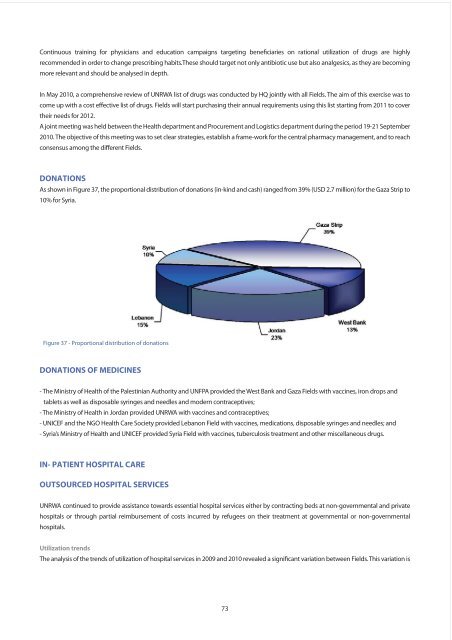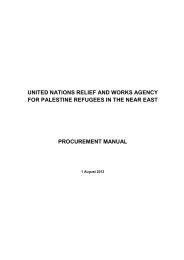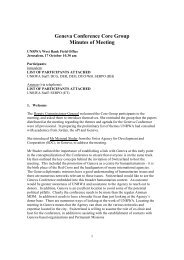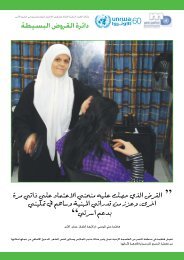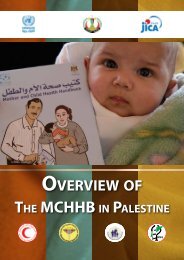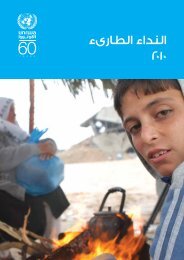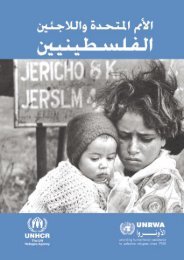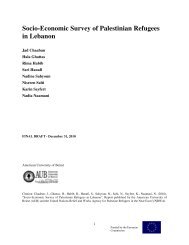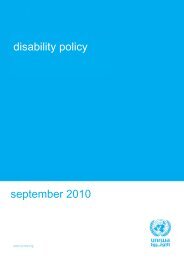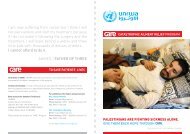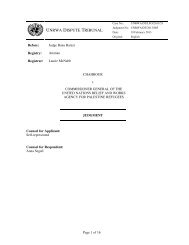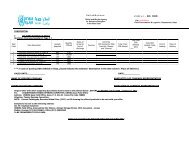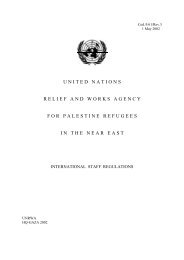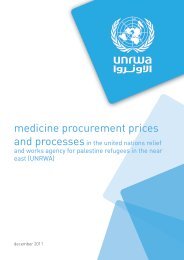Annual Report of the Department of Health 2010 - Unrwa
Annual Report of the Department of Health 2010 - Unrwa
Annual Report of the Department of Health 2010 - Unrwa
Create successful ePaper yourself
Turn your PDF publications into a flip-book with our unique Google optimized e-Paper software.
Continuous training for physicians and education campaigns targeting beneficiaries on rational utilization <strong>of</strong> drugs are highly<br />
recommended in order to change prescribing habits.These should target not only antibiotic use but also analgesics, as <strong>the</strong>y are becoming<br />
more relevant and should be analysed in depth.<br />
In May <strong>2010</strong>, a comprehensive review <strong>of</strong> UNRWA list <strong>of</strong> drugs was conducted by HQ jointly with all Fields. The aim <strong>of</strong> this exercise was to<br />
come up with a cost effective list <strong>of</strong> drugs. Fields will start purchasing <strong>the</strong>ir annual requirements using this list starting from 2011 to cover<br />
<strong>the</strong>ir needs for 2012.<br />
A joint meeting was held between <strong>the</strong> <strong>Health</strong> department and Procurement and Logistics department during <strong>the</strong> period 19-21 September<br />
<strong>2010</strong>. The objective <strong>of</strong> this meeting was to set clear strategies, establish a frame-work for <strong>the</strong> central pharmacy management, and to reach<br />
consensus among <strong>the</strong> different Fields.<br />
DONATIONS<br />
As shown in Figure 37, <strong>the</strong> proportional distribution <strong>of</strong> donations (in-kind and cash) ranged from 39% (USD 2.7 million) for <strong>the</strong> Gaza Strip to<br />
10% for Syria.<br />
Figure 37 - Proportional distribution <strong>of</strong> donations<br />
DONATIONS OF MEDICINES<br />
- The Ministry <strong>of</strong> <strong>Health</strong> <strong>of</strong> <strong>the</strong> Palestinian Authority and UNFPA provided <strong>the</strong> West Bank and Gaza Fields with vaccines, iron drops and<br />
tablets as well as disposable syringes and needles and modern contraceptives;<br />
- The Ministry <strong>of</strong> <strong>Health</strong> in Jordan provided UNRWA with vaccines and contraceptives;<br />
- UNICEF and <strong>the</strong> NGO <strong>Health</strong> Care Society provided Lebanon Field with vaccines, medications, disposable syringes and needles; and<br />
- Syria’s Ministry <strong>of</strong> <strong>Health</strong> and UNICEF provided Syria Field with vaccines, tuberculosis treatment and o<strong>the</strong>r miscellaneous drugs.<br />
IN- PATIENT HOSPITAL CARE<br />
OUTSOURCED HOSPITAL SERVICES<br />
UNRWA continued to provide assistance towards essential hospital services ei<strong>the</strong>r by contracting beds at non-governmental and private<br />
hospitals or through partial reimbursement <strong>of</strong> costs incurred by refugees on <strong>the</strong>ir treatment at governmental or non-governmental<br />
hospitals.<br />
Utilization trends<br />
The analysis <strong>of</strong> <strong>the</strong> trends <strong>of</strong> utilization <strong>of</strong> hospital services in 2009 and <strong>2010</strong> revealed a significant variation between Fields. This variation is<br />
73


